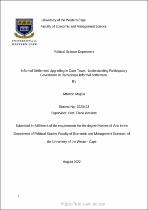| dc.description.abstract | In recent years there has been a rise of informal settlements in Cape Town, and other parts of the country. Informal settlements are not a new phenomenon in South Africa, due to apartheid spatial planning and segregated development, alongside rapid urbanization. Apartheid planning and urbanisation have enabled the growth of informal settlements, particularly as citizens seek alternative living spaces on the informal fringes of urban areas. This study examines obstacles to the upgrading of informal settlements in Cape Town, particularly Ramaphosa, a newly formed settlement on the edge of the City. The study was conducted using qualitative case study research which included fifteen interviews, online sources (Google Maps) and observation. During the course of the study I spent a great deal of time in the community of Ramaphosa, so empirical observation forms part of the methods. The study used Google satellite technology and Google maps, in getting a much better picture of the settlement. The study investigates the theory that upgrading of settlements can be achieved through participatory governance. It explores whether, citizen participation in government structures of development, engaging with local government, and mobilizing the community, can lead to the upgrading of a settlement. The findings show that the community of Ramaphosa created spaces of participation within their community, the community had a space to deliberate, engage, plan and consult regarding informal settlement upgrading. The community of Ramaphosa has strong grassroots activism and active citizenship. The community was able to mobilize for informal settlement upgrading. Through the active citizenship, activism and spaces of participation, the community were able to upgrade their informal settlement. However, their demands for a formal upgrading were not met. | en_US |

